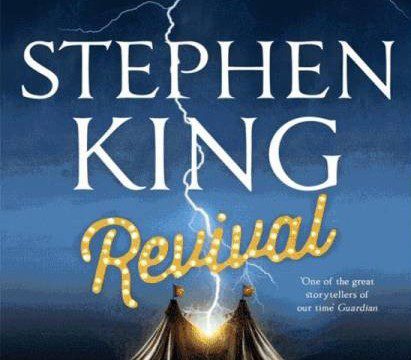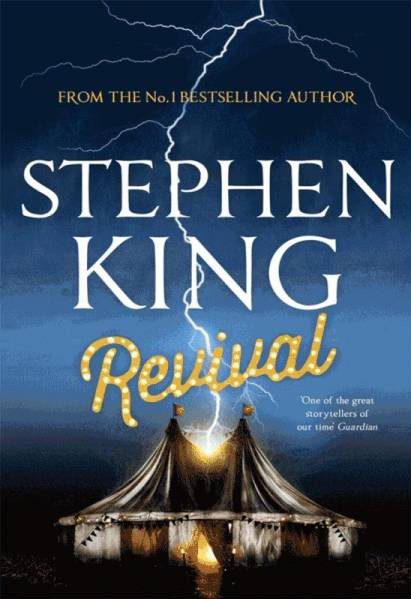Okay, right off the bat I have to say that I might not be the best person to review Stephen King’s new novel Revival. I’m firmly in the tank for King, and since first reading Rage (now out of print at the author’s request) in 7th grade, my fandom has only grown (I have three tattoos of images and quotes from King books, ladies). But I’ll try to be as objective as possible, because that’s what you’ve come to expect – and deserve – from GAMbIT’s sexy reporting. (Hey, if this book reviewing thing works out, maybe we can capitalize that b.)
It’s no secret that in King’s later works (pretty much everything after 2004’s Dark Tower VII, after which he was supposed to retire; instead he’s published 12 more novels and two short story anthologies) he’s hit upon a formula which he rather enjoys. First-person narratives in his work have become more commonplace, and the protagonist is usually an older man, not quite elderly, who is also usually a recovering addict of some kind (in 2013’s Doctor Sleep it was booze; in Revival it is heroin). There is an affair with a younger woman or a friendship with a younger man (in Revival it’s the former; in his last book, June’s Mr. Mercedes, it was both). And more often than not, there is an underlying current of curiosity. One thing you can’t deny about King, the man has never rested on his laurels. He could cash royalty checks for TBS’s near-constant airing of The Shawshank Redemption for the rest of his life, but his deft, agile mind demands that he still works, and his curiosity is reflected in his characters. He is, as Philip Seymour Hoffman described himself in The Master, “hopelessly inquisitive.”
The main character of Revival is Jamie Morton, the youngest of five siblings growing up in Harlow, Maine. The book begins in Jamie’s sixth year, when he meets the new Methodist pastor in town, Charles Jacobs, who Jamie immediately, tantalizingly, describes as “my nemesis.” Religion is another ever-present theme in King’s works, and some of his greatest antagonists have been zealots – think Big Jim Rennie in Under the Dome, Warden Norton in “Rita Hayworth and Shawshank Redemption,” Morgan Sloat in The Talisman; hell, even The Dark Tower‘s Man in Black was a kind of holy man. And while Charles Jacobs doesn’t neatly fit the slot of “bad guy,” he still becomes a dark, insidious presence in Jamie’s life.
Jacobs has a hobby: electricity. But more than just tinkering with gadgets in his garage, he slowly becomes obsessed with tapping into what he dubs “the secret electricity,” the force that powers all of existence. After Jacobs suffers a terrible loss, this obsession consumes his entire life. It would be irresponsible of me – and a dick move to boot – to go into too much detail, because Revival does such a great job of slowly but irrevocably transitioning from “unnerving” to “fucking terrifying.”
Revival‘s chief influence is the work of H.P. Lovecraft – he’s quoted in the epigraph, and references are made to his fictional tome The Necronomicon. This next sentence might be slightly spoiler-y, so read ahead at your own discretion, but the influence most keenly felt is Lovecraft’s “Re-Animator” (his short story, not the campy film version). I suppose in a book called Revival, written by Stephen goddamn King, that shouldn’t qualify as too much of a spoiler.
It’s hard for me to think of what happened next, let alone write it down, but I must, if only as a warning for anyone else who contemplates some similar experiment in damnation, and may read these words, and turn back because of them.
For much of Revival, the book rests nicely in the grooves that King has dug for himself. Which isn’t a knock against the man by any means. It’s the sharp left turn in the book’s fourth act that will either turn readers off or make their skin crawl (I had the latter sensation, which came as a morbidly excellent surprise). The ending is surprisingly dark and nihilistic, and I admire King for eschewing the happy (or happy-ish) endings that some other authors of his age might lean towards (read his excellent, bleak collection Full Dark, No Stars if you don’t believe me).
King might not have another masterpiece in him – I don’t know if we’ll ever see another horror novel with the scope and ambition of It or The Stand, from him or anyone – but what he does have are some killer stories to tell. Revival is absolutely one of them.


